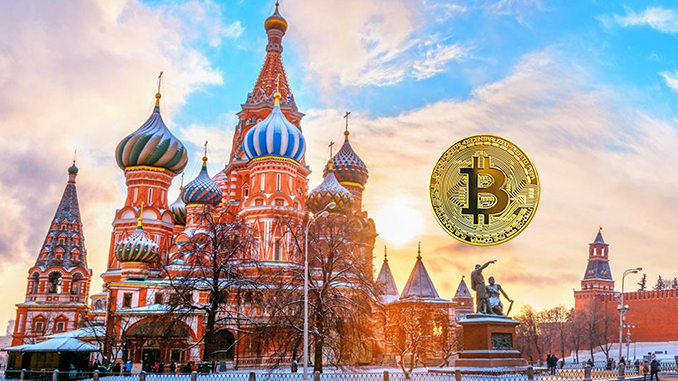
The sanctions against Russia are having an effect, and the ruble’s exchange rate is on a downward slide. In the situation, trading of ruble against bitcoin is increasing sharply. Crypto exchanges are called to lock out Russian customers.
Russia’s war of aggression against Ukraine has provoked serious sanctions from the West, which are now taking effect. The ruble – quoted in U.S. dollars – has lost more than 40 percent of its value since Monday. The background is the freezing of foreign exchange reserves by the Russian Central Bank and the capping of relations with Russian banks in general. In the situation, citizens of the country ruled by President Vladimir Putin are apparently fleeing with savings in Bitcoin (BTC). The crypto data service Kaiko shows in its newsletter that trading of bitcoin against rubles has reached volumes last seen ten months ago. However, it is also clear that there has been a sharp increase in demand for BTC against the Ukrainian national currency, the hryvnia (UAH). In both currencies, a significant surcharge must be accepted when buying Bitcoin.
BTC itself is currently benefiting from the threatening situation in Ukraine and the run on BTC. In the last 24 hours, Bitcoin quoted in U.S. dollars recorded a plus of around 15 percent and now stands at a good 43,000 U.S. dollars. Theses that an isolated Russia could use Bitcoin as a way out against sanctions probably play a role in the assessment. This is another reason why Ukrainian Deputy Prime Minister and Digital Minister Mykhailo Fedorov is already calling on all major crypto exchanges via Twitter to block Russian customers.
Ukraine wants to make it harder for Russia to access Bitcoin and Co.
In a second tweet, Fedorov also promises “generous rewards” for information leading to the identification of crypto wallets belonging to Russian and Belarusian politicians and their entourage. War crimes must be punished, Fedorov writes. Meanwhile, there is still uncertainty among major crypto exchanges about what to do. For global market leader Binance, for example, a spokesperson told U.S. broadcaster CNBC that it would not “freeze millions of accounts of innocent users” for the time being. As an argument for the position, the Binance spokesperson cited that crypto was created precisely for reasons of financial freedom, and banning Russian citizens now runs counter to that concept.
Binance is active in both Russia and Ukraine and has appealed for donations for the Ukraine emergency as well as providing $10 million itself. The Binance spokesperson at least assured that Western sanctions are supported and that accounts of people on sanctions lists are blocked accordingly. For crypto exchange Kraken, CEO Jesse Powell wrote on Twitter that he could understand the Ukrainian demands. But his company would not take action until there was a legal basis to do so, he said. Powell warned Russians that such a situation could happen quickly. Basically, he thus recommended them to keep balances in Bitcoin and other cryptocurrencies on external (hardware) wallets.
Conclusion: in war, Bitcoin is not apolitical
Observers believe that the major crypto exchanges will not be able to sustain their attempted neutral course for long. With reference to organizations such as sports federations or the EBU as the organizer of the Eurovision Song Contest, it is assumed that crypto exchanges will have to decide to exclude Russia and its citizens with some delay. An important point here is that even powerful crypto exchanges like Binance or Kraken would hardly risk losing access to quite a few banks because of their Russia business. In addition, there are rumors from the USA that crypto will play a detailed role in the event of further sanctions against Russia.
So, for the moment, it can be summed up: Never in its history has Bitcoin been assigned such an exposed position in a tense global political situation. Attempts by (Western) crypto exchanges to stay out of this dynamic will hardly be able to succeed. Bitcoin’s current price gains are on a shaky footing. The consequences of war and sanctions can also have a stronger impact on the Western financial markets than before, and it is doubtful whether BTC will be able to decouple itself from this.
Best place to buy Bitcoin:

Leave a Reply